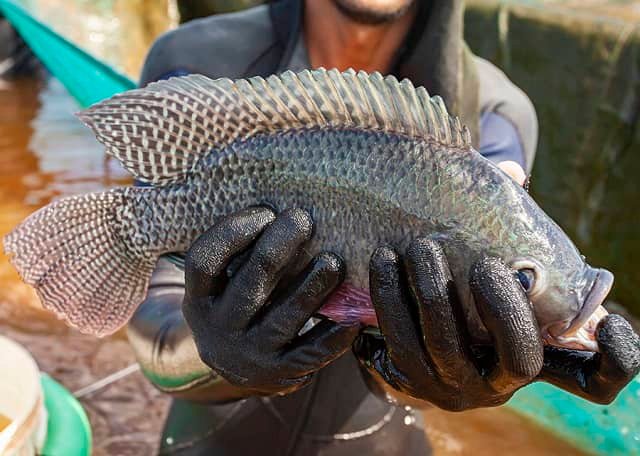
Nile Tilapia, a popular and delicious fish, is widely cultivated worldwide. However, like other aquaculture species, it faces rising feed costs. How can we optimize its growth and well-being for sustainable and productive aquaculture without increasing food prices?
A recent study suggests that the answer might lie in the microalga Spirulina platensis. Spirulina is packed with nutrients such as proteins, vitamins, minerals, and antioxidants. Previous research has demonstrated its potential for supplementing aquaculture feeds.
A team of researchers from the National Research Centre investigated the potential benefits of Spirulina platensis for the growth and health of Nile Tilapia (Oreochromis niloticus) by incorporating it into their diet at different levels: 0%, 1%, 2%, and 3%.
Supplementing Aquaculture Diets with Spirulina
Several studies have shown that supplementing fish diets with Spirulina can stimulate the immune system by increasing lysozyme and phagocyte activities, skin mucus, and regulating gene expression crucial for immunity.
Studies have also reported that Spirulina improves growth rate, carcass quality, and physiological responses to diseases and stress in various fish species.
Accelerated Growth
The results were clear: tilapia fed with a diet supplemented with 1% Spirulina showed a more significant improvement in growth performance. They gained weight faster, converted food more efficiently, and recorded the best Feed Conversion Ratio (FCR) of 1.09.
Comprehensive Biochemical Boost
The impact of Spirulina went beyond growth. Fish with the 1% Spirulina diet had higher levels of serum protein and globulin in the blood, indicating better immune function and nutrient utilization. Key biochemical parameters, such as liver enzymes, cholesterol, and glucose, remained within healthy ranges, suggesting positive metabolic effects.
Additionally, the researchers reported the potential impact of Spirulina on liver function, immune system, and stress response in tilapia.
Genetically Speaking: Growth Hormone Harmony
The study delved deeper, examining the expression of genes related to growth and metabolism.
Stay Always Informed
Join our communities to instantly receive the most important news, reports, and analysis from the aquaculture industry.
Fish fed with 1% Spirulina showed elevated levels of growth hormone (GH) in both the brain and muscle tissues. This hormone plays a crucial role in stimulating growth and development.
Furthermore, insulin-like growth factor 1 (IGF-1) and IGF-2, hormones downstream of GH that promote cell growth and differentiation, were also positively regulated in the liver and muscle of the 1% group.
The Mystery of Myostatin
Interestingly, the study also observed a correlation between the 1% Spirulina diet and higher levels of myostatin (MSTN) mRNA in muscle tissues. MSTN is a protein that acts as a natural brake on muscle growth.
While seemingly contradictory, this finding could reflect a complex interaction between growth and muscle quality. Further research is needed to fully understand this observation.
Conclusion
Overall, the study paints a clear picture: supplementing Nile Tilapia diets with 1% Spirulina platensis significantly improves growth performance, food utilization, biochemical parameters, and the expression of key genes related to growth.
This tiny alga emerges as a powerful tool for sustainable and healthy tilapia aquaculture, offering higher yields and potentially healthier fish for consumers. However, researchers caution that exceeding the optimal level of Spirulina supplementation may have detrimental effects on certain physiological aspects.
Spirulina’s potential extends beyond Nile Tilapia. Its impressive nutritional profile and positive effects on fish health make it a promising candidate for enhancing the sustainability and productivity of various aquaculture species. As we strive for a more environmentally conscious and resource-efficient food system, Spirulina offers a ray of hope for seafood to be healthy and delicious on future plates.
Contact
Hesham Abozaid,
E-mail: g_hesham@yahoo.com.
Tel.: 00201153046771
Reference (open access)
Abozaid, H., Elnady, A., Aboelhassan, D. M., Mansour, H., Abedo, A., Ghaly, I. S., … & Farag, I. M. (2024). Impact of Spirulina platensis as a Dietary Supplement on Growth Performance, Blood Biochemical Parameters, and Expression of Growth-Related Genes in Nile Tilapia (Oreochromis niloticus). Egyptian Journal of Veterinary Sciences, 55(4), 965-977.
Editor at the digital magazine AquaHoy. He holds a degree in Aquaculture Biology from the National University of Santa (UNS) and a Master’s degree in Science and Innovation Management from the Polytechnic University of Valencia, with postgraduate diplomas in Business Innovation and Innovation Management. He possesses extensive experience in the aquaculture and fisheries sector, having led the Fisheries Innovation Unit of the National Program for Innovation in Fisheries and Aquaculture (PNIPA). He has served as a senior consultant in technology watch, an innovation project formulator and advisor, and a lecturer at UNS. He is a member of the Peruvian College of Biologists and was recognized by the World Aquaculture Society (WAS) in 2016 for his contribution to aquaculture.







